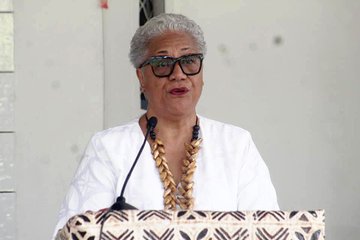The world must take urgent action on climate change at upcoming UN talks in Glasgow or low-lying Pacific nations will face a “dire” future, Samoa’s new leader has told AFP in an interview.
Fiame Naomi Mata’afa, who took office as Samoa’s first female prime minister in late July, gave a stark assessment of the Pacific’s prospects if efforts to tackle global warming continue to stall.
Mata’afa said rising seas were already swamping the region’s tiny atoll states — which include nations such as Tokelau, Tuvalu and Kiribati.
“With them, it’s a real and present circumstance — the water is gaining ground on them,” she said Monday, adding that violent cyclones were becoming more common across the South Pacific.
Major storms “used to be every 50 to 60 years, now it’s becoming every two to three years,” she said.
“For us, we’ve noticed the impact on our coastal areas, and about 70 percent of our country is settled on the coast.”
In a wide-ranging interview, Mata’afa also discussed the geopolitical rivalry between China and the United States in the Pacific, her disappointment at neighbouring Australia’s climate stance and the implications of her ground-breaking election victory.
But front of mind was the 26th edition of the UN Climate Change Conference of the Parties — COP26 — scheduled to start in the Scottish city of Glasgow in November.
The summit will involve negotiators from 196 countries in the biggest climate conference since landmark talks in Paris in 2015.
Mata’afa said it was crucial that participants honour the ambitious goal set in Paris to limit global warming to 1.5 degrees Celsius compared with pre-industrial levels.
To do that, she said carbon-emitting countries needed to prioritise saving the planet over economic growth, adding: “It’s not rocket science.”
“The Pacific was sort of a lone voice in the debate for a very long time, but I think the science advisers have now brought the world’s thinking towards that.”
The 64-year-old admitted her frustration at regional heavyweight Australia, which refuses to adopt a net-zero emissions target while remaining one of the world’s largest fossil fuel exporters.
“When you’re working as a collective as we do in the Pacific, Australia is a part of that,” she said.
“It is a frustrating element but that’s the reality of our lives, you can’t always agree.”
She also bristled at suggestions by some in Australia that Samoa did not understand the risks posed by forging close relations with China, which is seeking to expand its influence in the Pacific.
“What they were saying was we weren’t as well nuanced about how you have relationships with these big countries,” she said.
“We’ve been independent since 1962, so we’ve been around the block. I think we understand quite well what our relationships are, just as Australia has its own relationships.”
Mata’afa said the new government had no intention of changing its diplomatic recognition of Beijing and recognised the “One China” policy, although she remained open to trade with Taiwan.
She played down the impact of cancelling a Beijing-bankrolled port project agreed to by her predecessor, saying it was only at the feasibility stage when canned and would have no bearing on Samoa’s “mature” relationship with China.
Quizzed on rivalries between China and the United States in the region, Mata’afa said she was comfortable dealing with both superpowers to pursue Samoa’s best interests.
“In the geopolitical context, the reality of small countries is that we have to navigate our way through these larger countries and the issues they prioritise,” she said.
Mata’afa has been a long-time advocate for women’s rights and expressed hope her ground-breaking election win would signal a change of attitudes in the Pacific, which has one of the lowest rates of female parliamentary representation in the world.
“For gender role modelling, I’ve always believed that any women who achieved in whatever sector, once that happens other girls and women see that it can be done,” she said.
“It’s significant in that sense,” she said.
SOURCE:AFP/PACNEWS














